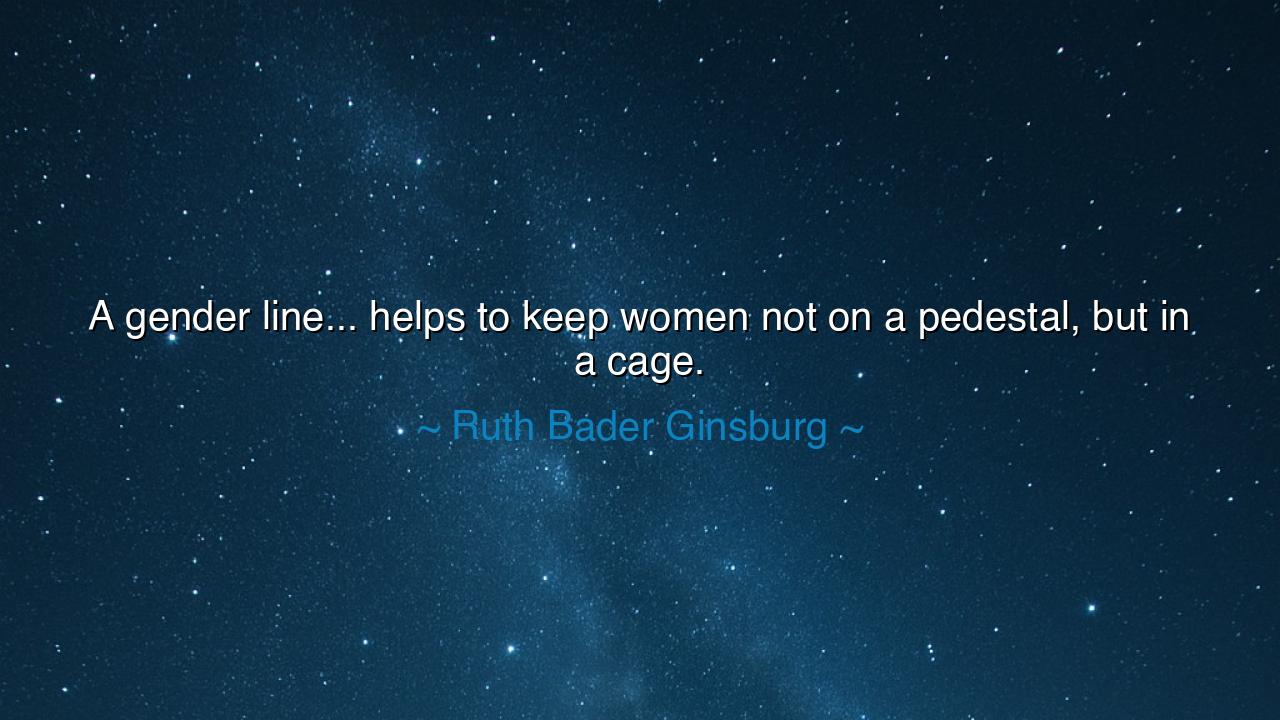
A gender line... helps to keep women not on a pedestal, but in a






The words of Justice Ruth Bader Ginsburg, “A gender line… helps to keep women not on a pedestal, but in a cage,” strike like a thunderclap across the centuries. In them is the wisdom of ages: a warning that what seems like honor may be a prison, and what masquerades as reverence may bind the spirit in chains. The pedestal, lofty and gleaming, is but another prison if it denies movement, growth, and freedom. What good is it to be exalted if one is not allowed to walk among equals?
In ancient times, societies often draped women in illusions of virtue and fragility, declaring them too pure for the rough contests of life. Yet such praise was double-edged. Like a golden cage for a songbird, it offered beauty but withheld liberty. To be praised as delicate was also to be barred from power. To be deemed sacred was to be denied choice. Thus, the gender line, drawn by unseen yet unyielding hands, kept half of humanity from their full strength.
Consider the story of Elizabeth Blackwell, the first woman in America to receive a medical degree in 1849. She was told that a woman studying medicine was a scandal, that her place was not in the lecture hall but in the home. When she was admitted to medical school, it was as a joke by men who thought the idea absurd. Yet through the scorn and ridicule, she endured. Her journey shows the truth of Ginsburg’s words: the cage is often enforced by laughter, dismissal, and the weight of tradition disguised as order.
And yet, cages may be broken. The bars are not made of iron, but of custom, law, and silence. When voices rise against them, they bend. When women, and men beside them, declare that honor without freedom is but another name for oppression, the pedestal crumbles, and the cage unlocks. Ginsburg herself, in her struggles for equal justice, chipped away at those bars—case by case, word by word—until the cage rattled with the sound of change.
So let the future remember this: to confine one half of humanity is to wound the whole. True reverence lies not in placing women above or below, but beside—equal in dignity, equal in power, equal in destiny. The cage, however gilded, must be shattered, and from its shards a more just world may be built. For freedom cannot bloom where lines divide, but only where those lines are erased by courage and wisdom.






AKDang anh kiet
Ruth Bader Ginsburg’s perspective on gender roles as a ‘cage’ is a sharp critique of the way society views and limits women. While women are often praised for fulfilling certain roles, those very roles can become suffocating. I think this speaks to the importance of breaking free from these limiting stereotypes. How can we shift the conversation so that women are recognized for their talents and individuality, not just their adherence to traditional gender expectations?
GDGold D.dragon
I find this quote very striking because it flips the common notion of women being on a pedestal. The ‘cage’ analogy is much more fitting when you consider how societal expectations of women often restrict their agency. It makes me think: why do we continue to enforce these outdated gender lines? How can we foster a society where individuals are valued for their capabilities rather than the roles they’re expected to fulfill because of their gender?
LVlinh vu
Ginsburg’s quote is an eye-opening reminder of how gender roles shape our lives in ways that often go unchallenged. The idea of a cage, instead of a pedestal, emphasizes that these gender expectations are more about control than respect. How do we change this narrative? Is it about shifting cultural norms, educating younger generations, or introducing policies that ensure equality? The change has to come from all angles to truly dismantle these gender lines.
DTduong dang tuan
This quote speaks volumes about how societal expectations of gender roles can keep women in restrictive boxes. The notion of a ‘cage’ is especially powerful—it suggests that rather than elevating women, society is trapping them with rigid expectations. I wonder, how do we begin to break down these lines? What steps can be taken to create more freedom for women to pursue their goals without being confined by gendered perceptions?
ARallhope realvcl
Ruth Bader Ginsburg’s words really resonate with the reality of gender inequality. We often hear that women are put on pedestals, but the idea of a pedestal itself implies that they are elevated and distanced from real power. The cage metaphor suggests that these gender expectations limit women’s autonomy and opportunities. How can we dismantle these gender lines and create a society where everyone is free to define themselves beyond outdated stereotypes?